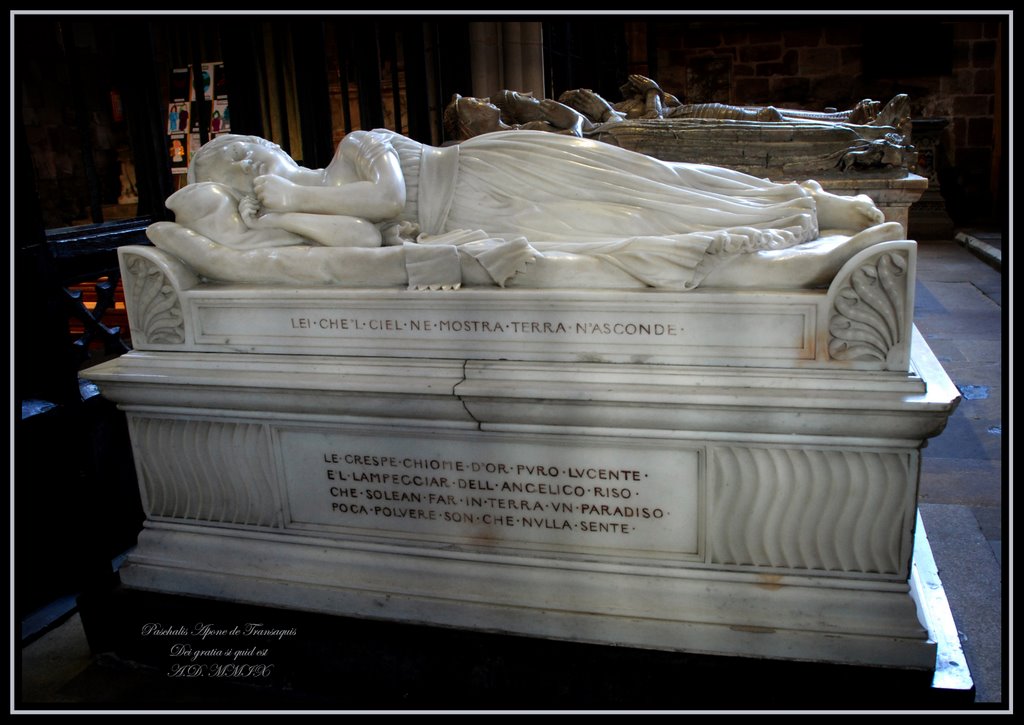
In a previous post, I copied 3 sonnets from Sorrows. Sacred to the Memory of Penelope, the collection of poems written by Brooke Boothby in memory of his daughter Penelope, who died one month before her sixth birthday. Here I transcribe three more sonnets (and correct another).
Full of sadness and melancholia, Sonnet 13 shows how inconsolable Boothby was. As says Sonnet Central, “Boothby never got over the loss of his only child Penelope,” and indeed they quote the last four verses of this sonnet:
SONNET XIII.
Though since my date of woe long years have roll’d.
Darkness ne’er draws the curtains round my head,
Nor orient morning opes her eyes of gold,
But Grief pursues my walks, or haunts my bed.
Visions, in sleep, their tristful shapes unfold;
Show Misery living, Hope and Pleasure dead,
Pale shrouded Beauty, kisses faint and cold,
Or murmur words the parting Angel said.
Thoughts, when awake, their wonted trains renew;
With all their stings my tortured breast assail;
Her faded form now glides before my view;
Her plaintive voice now floats upon the gale.
The hope how vain, that time should bring relief!
Time does but deeper root a real grief.
A version of Sonnet 17 was given by Sonnet Central under the tile A Locket of Hair, and it was copied by Wikisource. It is far from faithful to the original: beside the different title, punctuation was modified, and capitalized words were changed to lower-case, there is even a misprint. I give here the original version. This poem extols the beauty of Penelope’s golden hair, a treasure now forever lost:
SONNET XVII.
Bright, crisped threads of pure, translucent gold!
Ye, who were wont with Zephyr’s breath to play;
O’er the warm cheek, and ivory forehead stray;
Or clasp her neck in many an amorous fold;
Now, motionless, this little shrine must hold;
No more to wanton in the eye of day,
Or to the breeze your changing hues display;
For ever still, inanimate, and cold!
Poor, poor, last relic of an angel face!
Sad setting ray, no more thy orb is seen!
O, Beauty’s pattern, miracle of grace,
Must this be all that tells what thou hast been!
Come then, cold crystal, on this bosom lie,
Till Love, and Grief, and fond Remembrance die!
Finally, Sonnets 18 and 19 show Boothby preferring the sad memory of Penelope rather than joy while forgetting her:
SONNET XVIII.
Hast thou been wont to drop the lucid tear,
That o’er Love’s smiles involuntary strays!
Has thy lost soul oft hung in fixed gaze,
On eyes, the pole-stars of thy joy and fear!
Hast thou to one, than all the world more dear,
Devoted watchful nights and anxious days,
A blooming plant of heavenly birth to raise;
And mark’d each hour some latent grace appear!
Should now the source of Love’s soft tears be dry;
Should the fair stars be set to rise no more;
Scatter’d and pale, the roseate petals lie;
And all thy earthly cares and joys be o’er:
Still can the Muse recall the soothing sigh,
And to the troubled breast a moment’s calm restore.
SONNET XIX.
Yes, there’s a charm in grief; the heart-drawn tears,
That down my breast so oft in silence flow,
I would not for the warmest joys forego,
When Hope’s bright beam the youthful bosom cheers.
Though to these eyes if heaven’s fair face appears,
O’er the gay scene their veil dim sorrows throw;
And Love’s soft melody is tuned to woe,
If chance Love’s melody salute mine ears:
Yet did I stand on Lethe’s fabled shore,
My tortured heart would fly the proffer’d cure,
Though grief and memory might at once be o’er;
And rather Sorrow’s sharpest pangs endure,
Than lose of that dear form the thought alone,
In faded beauty, lifeless, pale, and gone.
Both Sonnet Central and Wikisource reproduce Sonnets 1, 2, 3, 5, 6, 12 and 15, also with some modifications in punctuation; there is a misprint in the penultimate verse of Sonnet 3, “at one” being written “atone”.
Previously published on Agapeta, 2015/05/28.

